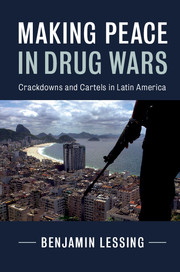Book contents
- Frontmatter
- Dedication
- Contents
- Figures
- Tables
- Preface
- Acknowledgments
- Abbreviations and Acronyms
- 1 Introduction
- PART I A THEORY OF CARTEL–STATE CONFLICT
- PART II CASE STUDIES
- PART III CONDITIONAL REPRESSION AS OUTCOME
- 8 The Challenge of Implementing Conditionality
- 9 Explaining Reform Efforts’ Success: Key Factors and Alternative Hypotheses
- 10 The Challenge of Sustaining Conditionality
- 11 Conclusion
- Appendix A Violent-Event Data
- Appendix B List of Interview Subjects
- Bibliography
- Index
- Miscellaneous Endmatter
9 - Explaining Reform Efforts’ Success: Key Factors and Alternative Hypotheses
from PART III - CONDITIONAL REPRESSION AS OUTCOME
Published online by Cambridge University Press: 17 November 2017
- Frontmatter
- Dedication
- Contents
- Figures
- Tables
- Preface
- Acknowledgments
- Abbreviations and Acronyms
- 1 Introduction
- PART I A THEORY OF CARTEL–STATE CONFLICT
- PART II CASE STUDIES
- PART III CONDITIONAL REPRESSION AS OUTCOME
- 8 The Challenge of Implementing Conditionality
- 9 Explaining Reform Efforts’ Success: Key Factors and Alternative Hypotheses
- 10 The Challenge of Sustaining Conditionality
- 11 Conclusion
- Appendix A Violent-Event Data
- Appendix B List of Interview Subjects
- Bibliography
- Index
- Miscellaneous Endmatter
Summary
Why were reformers able to overcome logistical and acceptability constraints and implement conditional repression in Colombia and Rio de Janeiro, but not Mexico? Reformers themselves suggested a number of candidate factors they saw as important; yet the presence of these varied considerably across cases. A comparative analysis suggests that three factors are particularly decisive: (1) the successful reframing of the problem as violence minimization, as opposed to ending the drug trade per se; (2) institutional cohesion, or where institutional structure is fragmented, political cohesion; and (3) the ability to hone and build support for conditional policies through a process of trial and error. Other factors may have played a more limited and idiosyncratic role in individual cases.
Why were some reformers able to overcome logistical and acceptability constraints and successfully implement conditional repression, while other reform attempts failed? During the qualitative interviews that inform the descriptive accounts of reform efforts in Part II, reformers and other state actors suggested a number of potentially decisive factors. In this section, I evaluate the relative importance of the most commonly proposed factors. Three of these factors, I will argue, were the most decisive in facilitating the formulation and adoption of conditional approaches:
Reframing the Problem: The officials leading anti-cartel efforts redefined the problem that repressive policy was supposed to solve, from drug trafficking writ large to drug-related violence.
Political/Institutional Cohesion: Police and other repressive agencies were unified by their institutional structure, by political cohesion across levels of government, or both.
Layering/Trial and Error: Reformers could experiment at a local or small scale, honing and building support for conditional policies before expanding them.
Three other factors may have played idiosyncratic roles in some of the cases, but were not decisive: a large pool of policy ideas to draw on, the largest cartel also being the most violent, and a leader not tied politically to status quo policies. Finally, three factors that reformers frequently emphasized appear to have played little role in practice: a forum for brainstorming without fear of superiors, delegation of responsibility by decision-makers to provide political cover, and what I call “Sino-Nixonian Effects”—the idea that, just as it took a known anti-communist like Nixon to open diplomatic relations with China, it takes a known hardliner on drug policy to implement conditional repression.
- Type
- Chapter
- Information
- Making Peace in Drug WarsCrackdowns and Cartels in Latin America, pp. 250 - 268Publisher: Cambridge University PressPrint publication year: 2017



